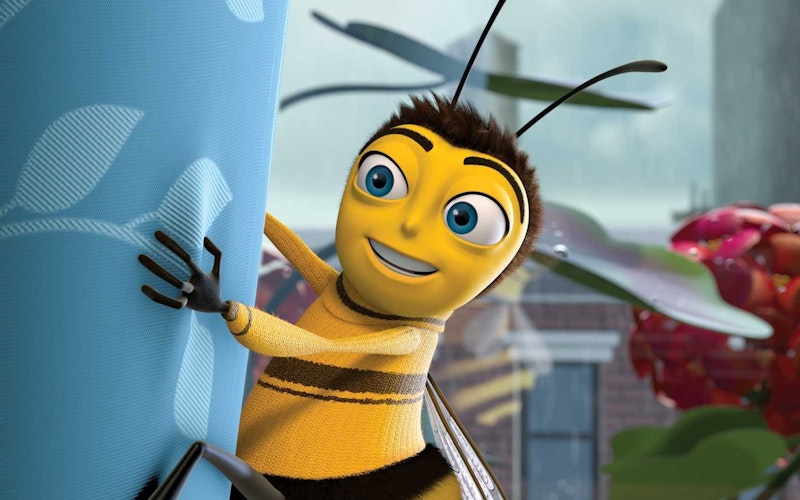
Movies
The Curious Persistence (and Religious Relevance) of Bee Movie
Strange things achieve Internet stardom: the tragic death of a lowland gorilla; a drawing of a nodding purple dove; a Kickstarter campaign seeking $10 for ingredients to make potato salad. While these sensations have come and gone, one unusual, Internet-driven obsession has persisted for a number of years now: memes involving 2007’s Bee Movie.
Bee Movie is a strange film, to say the least. Its humor is predictable, even for young audiences, considering the vast majority of the jokes are bee-related puns. The plot, however, is difficult even for parents to follow: a disenfranchised worker bee (voiced by Jerry Seinfeld) rejects a honey-producing job, befriends and becomes romantically involved with a human (Renee Zellweger), and accidentally causes a mass-extinction event before saving the day through, for some reason, an extended riff on the movie Airplane!
All of this to say that Bee Movie has received its belated attention through grace and not by merit. The movie remained relatively obscure until 2012, when Internet commenters began to draw attention to the strange plot. This led to the practice of copying and pasting the entire script onto various social media platforms, which resulted in growing online references to the movie. Its popularity exploded in 2016 when YouTuber Avoid at All Cost uploaded a video entitled “The Entire Bee Movie But Every Time They Say Bee It Gets Faster,” which received over 11 million views in two weeks before it was removed from the site. This viral hit spawned an entire genre of Bee Movie-related videos, many of which have been removed from YouTube for spam and copyright reasons.
The film’s popularity among Internet communities shows no sign of abating. Recently, Netflix published statistics revealing that one user had watched Bee Movie an astounding 357 times in 2017! That turned out to be a mother looking to soothe her young son, but what of the less practical devotion that the film continues to receive? What’s behind this online obsession with Bee Movie?
Bee Movie has received its belated attention through grace and not by merit.
Perhaps the answer lies in an understanding of millennial humor, which tends to favor absurdity. Washington Post columnist Elizabeth Bruenig recently wrote a fantastic article about this phenomena entitled “Why is Millennial Humor so Weird?” Bruenig connects this tendency towards absurdity with the collapse of large social narratives. We’ve been told that life works in a certain pattern—go to college, get a well-paying job, get married, start a family—and have found, particularly in the wake of the 2008 financial crisis and changing societal understandings of marriage, that this pattern doesn’t fit the experience.
Millennials are disenfranchised, with a lack of the opportunities we’ve been told to expect. To paraphrase Bruenig, this has led to a foundational doubt about the fundamental meaningfulness of the world. Absurdist humor becomes a way to make sense of a world in which overarching narratives don’t exist and value judgements are impossible to make. It is a comic exaggeration of what would otherwise be terrifying.
Bee Movie memes fit Bruenig’s hypothesis. The exultation of a mediocre, 2007 animated film is an attempt to use humor to cope with disenfranchisement from the world. As frivolous as the joke is, it betrays a kind of nihilism: if the world doesn’t make sense, why shouldn’t we revere something like Bee Movie with an almost religious fervor?
If worship is giving devotion to a worthy object, the Bee Movie memes act as a parody of worship, a lampooning of our instinct to seek transcendent values. A hallmark of postmodernism is the rejection of the idea that objects can have inherent value. If, as the saying goes, beauty is in the eye of the beholder, nothing really differentiates Citizen Kane from Bee Movie except an individual’s opinion. Nothing, as strange as it might sound, necessarily makes participation in a religious community more valuable than participation in an online community centered around a random children’s movie.
Despite this, I think the Bee Movie phenomenon is a good sign for religious institutions. The choice to give devotion to such an absurd object necessarily satirizes the idea that religious devotion is relative. Further, it fundamentally affirms that we have deep within us the urge to worship. Doubt about the fundamental meaningfulness of the world, as Bruenig noted, doesn’t seem to stop the search for meaning. In these Bee Movie memes, there is a genuine commitment that requires perseverance and dedication, undertaken in the context of a particular community dedicated to particular values. The Bee Movie adoration, ridiculous as it is, reveals something important about the postmodern condition. Having less confidence in intrinsic values and institutions isn’t stopping people from pursuing meaning, even if they go about that pursuit in a snarky and skeptical manner.
Much has been made of postmodernism’s threat to the Church. Yet as long as people continue to gather in community around common values—even if that commonality is a skepticism about the concept of values—I don’t see that threat as fatal. Indeed, I’d say that as long as there is evidence of religious devotion—even if it’s toward something as suspect as Bee Movie—news of the Church's irrelevance in the postmodern age has been greatly exaggerated.
Topics: Movies